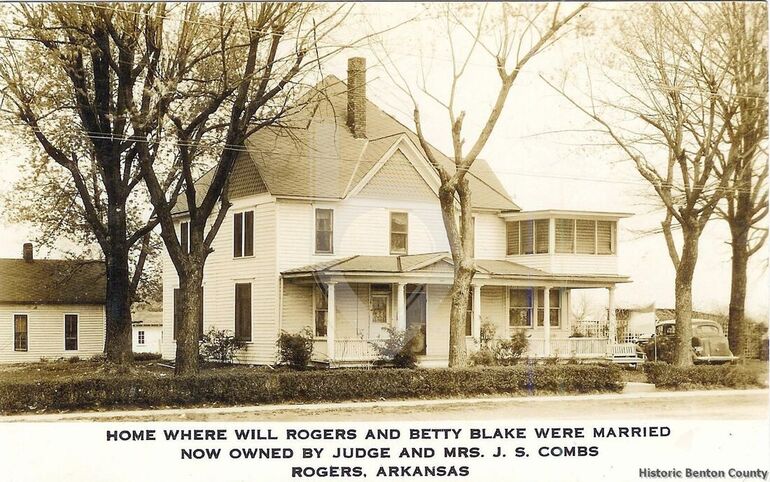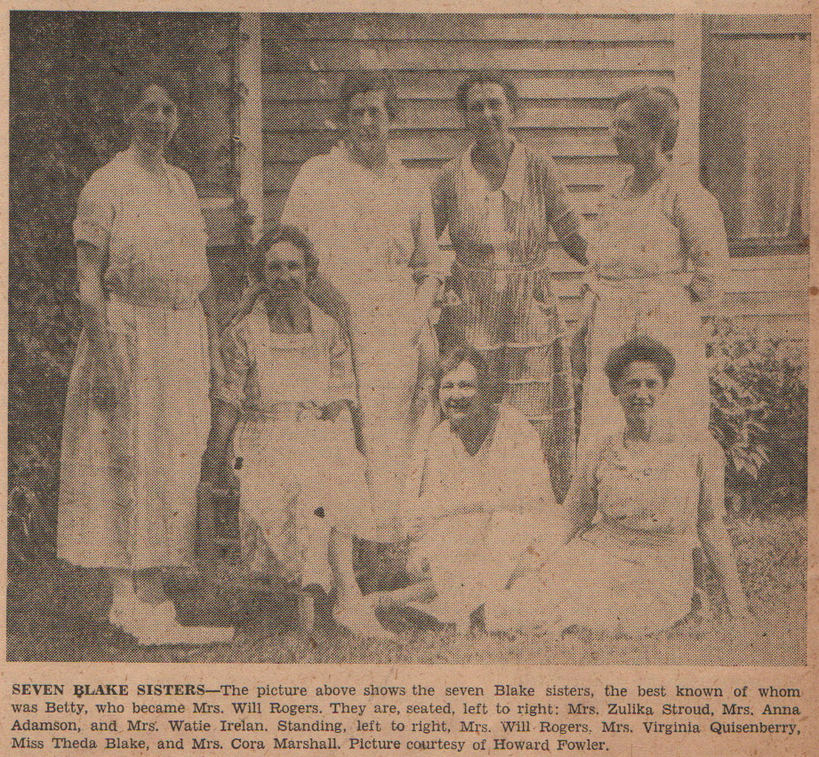Betty Blake and Will Rogers Married Here Nov. 25, 1908
Blake Home, With Its Seven Attractive Daughters, Was Center of Much Social Activity
Author Unknown - Article from the Rogers Daily News, July 1, 1950 (now NWA Democrat Gazette)
Blake Home, With Its Seven Attractive Daughters, Was Center of Much Social Activity
Author Unknown - Article from the Rogers Daily News, July 1, 1950 (now NWA Democrat Gazette)
More than local interest has for many years been manifested in the history of the Blake family of Rogers because one of the daughters, Betty, was the wife of the world famous and beloved humorist and philosopher, Will Rogers, of Oklahoma. Miss Betty Blake and Will Rogers were married November 25, 1908, at the home of the bride's mother, Mrs. Amelia Blake, 307 East Walnut street, in Rogers. At the time of their marriage, Will Rogers was 29 years old and Miss Blake 28.
(This house was blown down in a storm and was never rebuilt.)
Betty Blake was a daughter of Mr. And Mrs. J. W. Blake and at the time of her birth the family was living in a small log and frame house overlooking Monte Ne (Silver Springs) from a hilltop to the south. The house was destroyed by a windstorm early in the [19]30's. Mr. Blake ran a small mill in the little valley east of the hill and remains of the dam that furnished power for the mill were there for many years.
It is to be presumed that J. W. Blake was born in Benton county, for his father, Larkin Blake, and grandfather, Thomas K. Blake, came to this section from east Tennessee before the Civil War days. Miss Blake's father died when she was a little girl and for a number of years the support of the family of seven daughters and two sons fell upon the shoulders of the mother, who was a dressmaker.
Mrs. Blake was a member of the Crowder family, which came to Benton county in 1852 from Buncombe county, North Carolina, and settled near Bentonville. So on both sides of the family, Betty Blake Rogers was a descendant of Northwest Arkansas pioneers, and members of both families were prominent figures in early Benton county history. An uncle, Taylor Blake, served several terms as sheriff, and another uncle, Colonel Bo Y. Blake, was a West Point graduate with a long and adventurous career in this and other countries.
When the Blake family held a reunion in Rogers Thanksgiving day 1904, at the home of the mother, local papers noted that all except the two youngest daughters were in some way connected with railroad work. The oldest son, John 21 years old, was killed on August 6, 1889, in a railroad accident at Purdy, Mo. He was a brakeman and was buried at Bentonville by the side of his father. Mrs. Amelia Blake is also buried there.
The oldest daughter was Mrs. Cora Marshall, and her husband, Will Marshall, was a telegraph operator. Mrs. Waite Irelan's husband, Arthur Irelan, was a railroad mail clerk. Mrs. Anna Adamson, wife of Lee Adamson, was a telegraph operator, and her husband was in charge of a railroad bridge gang. Jim (Sandy) Blake was railway agent at Nowata, I. T., while Betty Blake was billing clerk in the Frisco station at Jenny Lind, Ark.
Theda Blake, one of the older daughters, was teaching in the Rogers Schools then and later clerked for a number of years at Stroud's. The two youngest daughters, Virginia and Zulika, were in school. Virginia married B. W. Quisenberry, who was in the drug business here for several years before locating in Joplin.
One of their sons, Bruce Quisenberry, traveled with Will Rogers as his business manager for some years. The youngest daughter, Zulika, married Everette Stroud, a son of J. W. Stroud, who was killed in November, 1929.
In the younger days of Rogers, the five older sisters of the Blake family were very active in the social affairs of the town and it is quite impossible to find a gathering in which one or more of them did not participate. With so many attractive young women the Blake home was a natural social center.
Hundreds of stories have been printed in magazines and papers regarding the early life of Betty Blake and Will Rogers and their courtship. These stories were interesting to Rogers friends who knew them so well, chiefly because of the many inaccuracies and mis-statements.
It is to be presumed that J. W. Blake was born in Benton county, for his father, Larkin Blake, and grandfather, Thomas K. Blake, came to this section from east Tennessee before the Civil War days. Miss Blake's father died when she was a little girl and for a number of years the support of the family of seven daughters and two sons fell upon the shoulders of the mother, who was a dressmaker.
Mrs. Blake was a member of the Crowder family, which came to Benton county in 1852 from Buncombe county, North Carolina, and settled near Bentonville. So on both sides of the family, Betty Blake Rogers was a descendant of Northwest Arkansas pioneers, and members of both families were prominent figures in early Benton county history. An uncle, Taylor Blake, served several terms as sheriff, and another uncle, Colonel Bo Y. Blake, was a West Point graduate with a long and adventurous career in this and other countries.
When the Blake family held a reunion in Rogers Thanksgiving day 1904, at the home of the mother, local papers noted that all except the two youngest daughters were in some way connected with railroad work. The oldest son, John 21 years old, was killed on August 6, 1889, in a railroad accident at Purdy, Mo. He was a brakeman and was buried at Bentonville by the side of his father. Mrs. Amelia Blake is also buried there.
The oldest daughter was Mrs. Cora Marshall, and her husband, Will Marshall, was a telegraph operator. Mrs. Waite Irelan's husband, Arthur Irelan, was a railroad mail clerk. Mrs. Anna Adamson, wife of Lee Adamson, was a telegraph operator, and her husband was in charge of a railroad bridge gang. Jim (Sandy) Blake was railway agent at Nowata, I. T., while Betty Blake was billing clerk in the Frisco station at Jenny Lind, Ark.
Theda Blake, one of the older daughters, was teaching in the Rogers Schools then and later clerked for a number of years at Stroud's. The two youngest daughters, Virginia and Zulika, were in school. Virginia married B. W. Quisenberry, who was in the drug business here for several years before locating in Joplin.
One of their sons, Bruce Quisenberry, traveled with Will Rogers as his business manager for some years. The youngest daughter, Zulika, married Everette Stroud, a son of J. W. Stroud, who was killed in November, 1929.
In the younger days of Rogers, the five older sisters of the Blake family were very active in the social affairs of the town and it is quite impossible to find a gathering in which one or more of them did not participate. With so many attractive young women the Blake home was a natural social center.
Hundreds of stories have been printed in magazines and papers regarding the early life of Betty Blake and Will Rogers and their courtship. These stories were interesting to Rogers friends who knew them so well, chiefly because of the many inaccuracies and mis-statements.
One story said that Betty Blake first met Will Rogers when she was a girl of 16 teaching school in the Indian Territory. Betty never taught school anywhere for she quit school in the grades and had very little more formal education than did her famous husband, who had little liking for the discipline of school life. Betty was 28 years old when she married Rogers and had known him for several years, meeting him first when she was working with brother, Jim Blake, a Missouri Pacific agent in a small Oklahoma town in the section where Rogers and his friends roamed.
Betty worked as a type setter in the local printing offices over a period of years but never would accept a steady job. She worked only when she felt like it or needed a little extra money. She helped out in emergencies and worked in the office of the Rogers Democrat in November, 1903, while the editor was on his honeymoon. She also clerked for a short time in Parks Dry Goods store. But she preferred railroad work and assisted at a number of points.
That Betty did not marry until she was fairly well along in years was no accident. She was a fine looking, healthy, attractive girl and there were always plenty of young men who sought her hand in marriage but she was in no hurry to wed - not even when she met Will Rogers.
Mr. and Mrs. Will Rogers never lived in Rogers and it is doubted that he made more than a couple of visits here before they were married. Few of Rogers people had ever heard of him before the marriage. His courtship was not a long one - but tradition has it that it was ardent. During the early years of their married life they spent some time here each year, and while Will was making trips that took him to many cities the children were here with their grandmother. So there was little time for local stories.
In 1910 there is this paragraph in the Rogers Democrat: "All the calves, colts and dogs on the east side have taken to the tall timber for the summer. Will Rogers is here again and every small boy in the neighborhood is trying to emulate Will's skill in roping. They have just about worn out several hitching posts on East Walnut street. No one worries about that. It is when the boys begin roping each other that the mothers protest. It means too much darning and repairing - clothes and hides."
It must be remembered that in those early days of the Blake-Rogers marriage, no special attention was paid to their affairs for to local citizens Will Rogers was only another vaudeville performer and most of the local interest was occasioned by the fact that Will's father was a ranch owner and a banker. Most people figured that when Betty and Will grew tired of rambling over the country they would settle down on an Oklahoma ranch and raise their family. As a matter of fact, that was their own idea for years.
No one was more surprised than Will Rogers when he became a national figure. All who knew him in his younger days are agreed that his phenomenal career was not the result of ambition or a desire for fame or money. It just seemed to happen without rhyme or reason. Will was a good-natured, friendly fellow with an engaging grin, and as he often said, he never met a real stranger. His friends just hoped he would hurry up and get travel and stage out of his system and settle down to work and make something of himself.
Rogers was generous to a fault and gave liberally to any local project he thought was really needed. During the first World War he gave one-third of all his Red Cross donations to the Rogers branch. Several times he gave $50 or more to help grade and gravel the main streets of this town. These and other gifts were never given publicity - that was always a provision of his donations.
Betty worked as a type setter in the local printing offices over a period of years but never would accept a steady job. She worked only when she felt like it or needed a little extra money. She helped out in emergencies and worked in the office of the Rogers Democrat in November, 1903, while the editor was on his honeymoon. She also clerked for a short time in Parks Dry Goods store. But she preferred railroad work and assisted at a number of points.
That Betty did not marry until she was fairly well along in years was no accident. She was a fine looking, healthy, attractive girl and there were always plenty of young men who sought her hand in marriage but she was in no hurry to wed - not even when she met Will Rogers.
Mr. and Mrs. Will Rogers never lived in Rogers and it is doubted that he made more than a couple of visits here before they were married. Few of Rogers people had ever heard of him before the marriage. His courtship was not a long one - but tradition has it that it was ardent. During the early years of their married life they spent some time here each year, and while Will was making trips that took him to many cities the children were here with their grandmother. So there was little time for local stories.
In 1910 there is this paragraph in the Rogers Democrat: "All the calves, colts and dogs on the east side have taken to the tall timber for the summer. Will Rogers is here again and every small boy in the neighborhood is trying to emulate Will's skill in roping. They have just about worn out several hitching posts on East Walnut street. No one worries about that. It is when the boys begin roping each other that the mothers protest. It means too much darning and repairing - clothes and hides."
It must be remembered that in those early days of the Blake-Rogers marriage, no special attention was paid to their affairs for to local citizens Will Rogers was only another vaudeville performer and most of the local interest was occasioned by the fact that Will's father was a ranch owner and a banker. Most people figured that when Betty and Will grew tired of rambling over the country they would settle down on an Oklahoma ranch and raise their family. As a matter of fact, that was their own idea for years.
No one was more surprised than Will Rogers when he became a national figure. All who knew him in his younger days are agreed that his phenomenal career was not the result of ambition or a desire for fame or money. It just seemed to happen without rhyme or reason. Will was a good-natured, friendly fellow with an engaging grin, and as he often said, he never met a real stranger. His friends just hoped he would hurry up and get travel and stage out of his system and settle down to work and make something of himself.
Rogers was generous to a fault and gave liberally to any local project he thought was really needed. During the first World War he gave one-third of all his Red Cross donations to the Rogers branch. Several times he gave $50 or more to help grade and gravel the main streets of this town. These and other gifts were never given publicity - that was always a provision of his donations.


